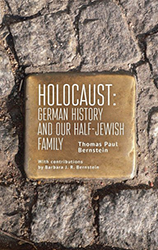The fate of French Jewry during the Nazis’ occupation of France is not a new story. From Irene Nemirovsky’s posthumous contemporary account, Suite Française, to Nobel Prize winner Patrick Modiano’s more recent fiction, the tragic tale of how the French collaborationist Vichy government helped the Nazis round up and deport a considerable percentage of French Jews has been well documented. But as that horrific era recedes and memories fade, it becomes more vital to recall it. For many French people of later generations, even among descendants of victims and survivors, the events of the 1940s remain murky. Bringing them to light is especially necessary in a period that has seen a rise in antisemitic incidents in France and elsewhere. Thus, Anne Berest’s The Postcard, a finalist for France’s most prestigious literary award, has been a hit in France.
Now appearing in English, the book weaves several strands together to achieve a highly original take. Billed as a novel, the book is in fact a memoir with fictional elements. It describes how Berest and her mother Leila piece together the story of their Jewish ancestry after an anonymous postcard arrives in her mother’s mailbox in the early 2000s. It contains only the names of four people: Leila’s grandparents and aunt and uncle, all of whom were deported to Auschwitz, where they died. Although she is intrigued by the vexing questions of who sent the postcard and why, Anne puts it out of her mind for a number of years — until she hears that her own young daughter has been the object of some schoolyard antisemitism. This leads her to want to find out more about the Jewish side of her family, which is something that Leila, a linguistics scholar and translator, has been reluctant to discuss with Anne and her siblings. Leila, however, has been involved in a legal proceeding to add her relatives’ names to a Holocaust memorial in the village where they resided and, in the process, has accumulated a wealth of documentation about their history. Using this treasure trove, Berest constructs a circumstantial account of the Rabinovitch family’s journey from post – Revolutionary Russia via Latvia and Palestine to Paris, where they prosper and try to assimilate into French society, only to be ensnared in the Holocaust. Berest renders their personalities with a novelist’s flair and an eye for dramatic detail.
While Leila’s grandparents and two of their three children perish, the oldest sibling, Myriam, is spared through a combination of bureaucratic bungling and a fortuitous marriage into a family active in the Resistance — the family of the famous French painter Francis Picabia. Myriam is Leila’s mother and Anne’s grandmother, and her story occupies a major portion of the final section of the book — a story dramatic enough to be its own novel, a kind of spy thriller with a ménage à trois and guest appearances by painter Jean Arp and playwright Samuel Beckett. In between long sections recounting the stories of the Rabinovitches, Berest tells of her and her mother’s enlightening but often frustrating attempts to find out who sent the anonymous postcard and why. She discovers the answer quite inadvertently, after almost giving up on what had seemed a Quixotic quest. But that discovery only heightens one of the key themes in the book: the importance of memory.
Mixing fact and fiction, Berest writes a searing account that, in places, is difficult to read because of its unsparing details about deportation and the equally harrowing experiences of Myriam’s survival. This is lightened somewhat by the comedy of Anne’s and Leila’s attempts to play detective. Occasionally there is a somewhat clunky feel to the narrative, but the overall triumph of the book is its ability to blend diverse materials into a compelling and memorable whole.




